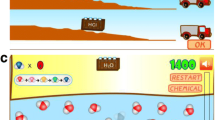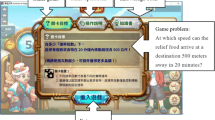Abstract
Scientific Inquiry refers to the study that learners conduct with similar or simulated scientific research. It is a problem-oriented learning activity with quite rich contents and forms driven by curiosity. It is also a method by taking the initiative to acquire scientific knowledge and understand science. The game-based learning environment for scientific inquiry (GBLESI) can effectively expand the scope for learners. This article takes the NMR experiments as an example to introduce its Design and Implementation.
Preview
Unable to display preview. Download preview PDF.
Similar content being viewed by others
References
Downes, S.M.: Truth, Selection and scientific inquiry. Biology and Philosophy 15(3), 425–442 (2000)
Davis, K.S., Falba, C.J.: Integrating Technology in Elementary Preservice Preservice Teacher Education. Orchestrating scientific inquiry in Meaningful Ways 13(4), 303–329 (2002)
Ieronutti, L., Chittaro, L.: Employing virtual humans for education and training in X3D/VRML worlds. Computers & Education 49(1), 93–109 (2007)
National Research Council of USA: Inquiry and the National Science Education Standards: A Guide for Teaching and Learning, National Academies Press (2000)
Murano, P., Mackey, D.: Usefulness of VRML building models in a direction finding context. Interacting with Computers 19(3), 305–313 (2007)
Liu, Q., Sourin, A.: Function-based shape modelling extension of the Virtual Reality Modelling Language. Computers & Graphics 39(4), 629–645 (2006)
Koročsec, D., Holobar, A., Divjak, M., Zazula, D.: Building interactive virtual environments for simulated training in medicine using VRML and Java/JavaScript. Computer Methods and Programs in Biomedicine 80, 61–70 (2005)
Moore, K., Dykes, J., Wood, J.: Using Java to interact with geo-referenced VRML within a virtual field course. Computers & Geosciences 25(10), 1125–1136 (1999)
Whiteman, P.: How the bananas got their pyjamas: A study of the metamorphosis of preschoolers’ spontaneous singing as viewed through Vygotsky’s Zone of Proximal Development. A Thesis for Doctor Degree of Philosophy, the University of New South Wales (2001)
Yun, R., Pan, Z., et al.: An Educational Virtual Environment for Studying Physics Concept in High Schools. In: Lau, R.W.H., Li, Q., Cheung, R., Liu, W. (eds.) ICWL 2005. LNCS, vol. 3583, pp. 326–331. Springer, Heidelberg (2005)
Davison, A.: Pro JavaTM 6 3D Game Development, pp.3–12. Apress (2007)
Dave, A., Kevin, D.H.: Beginning OpenGL Game Programming, Course PTR (2004)
Multigen-Paradigm Incorporated (online2006.01.20), http://www.multigen.com
James, G., Bill, J., et al.: The Java Language Specification (1996)(online2006.01), http://java.sun.com/docs/books/jls/html/index.html
Author information
Authors and Affiliations
Editor information
Rights and permissions
Copyright information
© 2008 Springer-Verlag Berlin Heidelberg
About this paper
Cite this paper
Yun, R., Wang, M., Li, Y. (2008). Design and Implementation of Game-Based Learning Environment for Scientific Inquiry. In: Pan, Z., Zhang, X., El Rhalibi, A., Woo, W., Li, Y. (eds) Technologies for E-Learning and Digital Entertainment. Edutainment 2008. Lecture Notes in Computer Science, vol 5093. Springer, Berlin, Heidelberg. https://doi.org/10.1007/978-3-540-69736-7_7
Download citation
DOI: https://doi.org/10.1007/978-3-540-69736-7_7
Publisher Name: Springer, Berlin, Heidelberg
Print ISBN: 978-3-540-69734-3
Online ISBN: 978-3-540-69736-7
eBook Packages: Computer ScienceComputer Science (R0)




